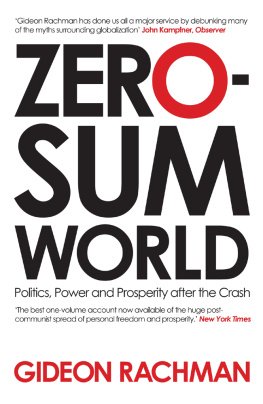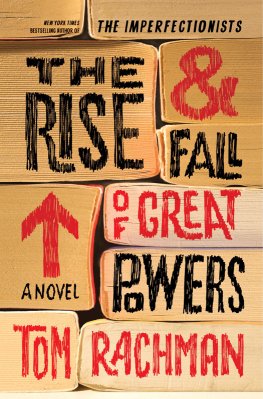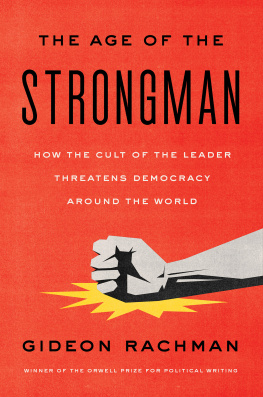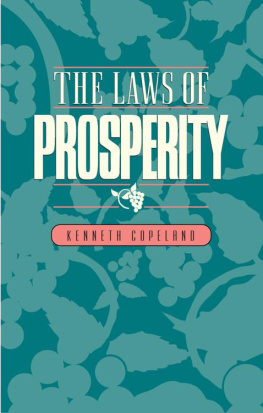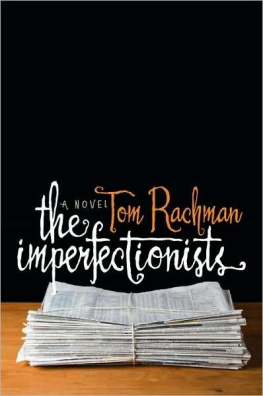Rachman - Zero-sum world: politics, power and prosperity after the Crash
Here you can read online Rachman - Zero-sum world: politics, power and prosperity after the Crash full text of the book (entire story) in english for free. Download pdf and epub, get meaning, cover and reviews about this ebook. City: London, year: 2014, publisher: Atlantic Books Ltd, genre: Politics. Description of the work, (preface) as well as reviews are available. Best literature library LitArk.com created for fans of good reading and offers a wide selection of genres:
Romance novel
Science fiction
Adventure
Detective
Science
History
Home and family
Prose
Art
Politics
Computer
Non-fiction
Religion
Business
Children
Humor
Choose a favorite category and find really read worthwhile books. Enjoy immersion in the world of imagination, feel the emotions of the characters or learn something new for yourself, make an fascinating discovery.
Zero-sum world: politics, power and prosperity after the Crash: summary, description and annotation
We offer to read an annotation, description, summary or preface (depends on what the author of the book "Zero-sum world: politics, power and prosperity after the Crash" wrote himself). If you haven't found the necessary information about the book — write in the comments, we will try to find it.
Rachman: author's other books
Who wrote Zero-sum world: politics, power and prosperity after the Crash? Find out the surname, the name of the author of the book and a list of all author's works by series.
Zero-sum world: politics, power and prosperity after the Crash — read online for free the complete book (whole text) full work
Below is the text of the book, divided by pages. System saving the place of the last page read, allows you to conveniently read the book "Zero-sum world: politics, power and prosperity after the Crash" online for free, without having to search again every time where you left off. Put a bookmark, and you can go to the page where you finished reading at any time.
Font size:
Interval:
Bookmark:

ZERO-SUM WORLD
Gideon Rachman became chief foreign affairs columnist for the Financial Times in July 2006. He joined the FT after a fifteen-year career at The Economist, which included spells as a foreign correspondent in Brussels, Washington and Bangkok. He also edited The Economists business and Asia sections. His particular interests include American foreign policy, the European Union and globalization.

First published in 2010 in Great britain by Atlantic books,
an imprint of Grove Atlantic Ltd.
This edition published in Great Britain in 2014
by Atlantic Books Ltd.
Copyright Gideon Rachman, 2010
Foreword Gideon Rachman, 2011
The moral right of Gideon Rachman be identified as the author of this work has been asserted in accordance with the Copyright, Designs and Patents Act of 1988.
All rights reserved. No part of this publication may be reproduced, stored in a retrieval system or transmitted in any form or by any means, electronic, mechanical, photocopying, recording, or otherwise, without prior permission both of the copyright owner and the above publisher of this book.
Every effort has been made to contact copyright holders. The publishers will be pleased to make goodany omissions or rectify any mistakes brought to their attention at the earliest opportunity.
eISBN 9780857891624
A CIP catalogue record for this book is available
from the British Library.
Atlantic Books Ltd.
Ormond House
2627 Boswell Street
London WC1N 3JZ
www.atlantic-books.co.uk
To Olivia, my companion in Cambridge, Washington,
Bangkok and Brussels
C ONTENTS
ZERO-SUM WORLD
F OREWORD
W riting a book on contemporary politics is a hazardous exercise. All such works are vulnerable to unexpected shifts in world affairs that can make wise-sounding predictions suddenly seem foolish. I finished the first draft of Zero-Sum World in January 2010. In the following year, however, the central arguments of the book seem to me to have gained in strength.
What I call the rise of zero-sum logic in international politics has become more visible in three vital areas: US-Chinese relations, the crisis inside the European Union, and global governance. Meanwhile, in early 2011 popular revolts across the Arab world above all, in Egypt have injected new uncertainties into global politics. These events, foreshadowed in my book, are still unfolding. Depending on how they turn out, they could end up either re-energizing the liberal narrative of the Age of Optimism or further heightening the uncertainties of the Age of Anxiety.
An increase in tensions between America and China was one of the most striking political developments of 2010. In the background was the growing sense that the financial crisis had marked an important
American anxiety about the rise of China was increased in 2010 by the knowledge that the US budget deficit was out of control. Towards the end of that year, Admiral Michael Mullen, the head of the Joint Chiefs of Staff, argued that Americas burgeoning national debt was now the single biggest threat to national security. He pointed out that some 50 per cent of the discretionary spending in the US budget goes on the military. Observing the deep cuts in military spending being made by cash-strapped European governments (including Britain), the admiral remarked, I do worry that it wont be too long before these kind of cuts will be part of our future as well, and that would be very dangerous.
The perception of an emerging threat to Americas military dominance of the Pacific was strengthened by Chinas military build-up. Shortly before a trip to Beijing in January 2011, Robert Gates, the US defence secretary, expressed concern at Chinas latest weapons developments. On arriving in Beijing, Mr Gates was greeted with the spectacle of the maiden flight of Chinas first ever stealth fighter. To many observers, it looked like a deliberate and bellicose message from Beijing to Washington.
It is not just the United States that worries about a more assertive China. Possibly emboldened by a sense that power was moving their way in the aftermath of the economic crisis, the Chinese government took a noticeably tougher line with its neighbours during the course of 2010. Talking to Indian officials, I found mounting alarm about what the government in New Delhi claimed was increasing Chinese pressure over the two countries unsettled territorial dispute over the Indian province of Arunchal Pradesh. The Indians also looked with alarm at Chinas close strategic and economic ties with Indias neighbours Sri Lanka, Pakistan and Burma.
Chinas assertion that its territorial claims in the South China Sea were now a core national interest alarmed many of its South-East Asian neighbours, in particular Vietnam. That led Hillary Clinton, the US secretary of state, to assert that America too has a national interest in developments in the South China Sea a statement that was received with some hostility in Beijing. Japan was yet another Asian power to take fright at the spectacle of a more assertive China. A clash over a Chinese fishing boat that strayed into waters claimed by Japan became a major diplomatic incident in the second half of 2010 and sent Japan hurtling back into the arms of Uncle Sam. Indeed, one of the biggest geopolitical shifts since I completed the first draft of this book has been Japans abandonment of its flirtation with a rapprochement with China. Following the fall of the Hatoyama government in June 2010, Naoto Kan, the new Japanese prime minister, shifted his countrys policy back in a more pro-American direction.
Inept and overassertive Chinese diplomacy during the course of 2010 handed the US a diplomatic opportunity in the emerging struggle for power and influence between the two nations. Increasingly disillusioned by its relationship with China, the US began to cultivate much warmer military and diplomatic ties with Chinas neighbours in particular Indeed, just as the Indians worried about encirclement by allies of China, so China began to look anxiously at a network of powerful American allies surrounding the Middle Kingdom including Japan, India, South Korea and Australia.
A battle to win friends and influence allies is clearly under way between the US and China. Some American strategists have argued that their countrys budgetary problems could be compensated for by the construction of a network of Asian alliances, in a policy of soft containment of China. And yet many countries in the region face a strategic dilemma as their economic and security interests increasingly diverge. China is now the major trading partner of Japan, South Korea and Australia. But these countries key military relationship is with the United States. Unless China massively overplays its hand, these economic ties may end up mattering more in the long run, particularly amidst lingering questions about Americas staying power in the Asia-Pacific region. As Kishore Mahbubani, the Singaporean academic, put it to me in early 2011, The countries of the region have to be careful. We know China will still be here in a thousand years, time. We dont know if the United States will still be here in a hundred years time. (I decided not to take this reproof personally.)
While security and strategic tensions between the US and China soared over the course of 2010, economic tensions continued to simmer. But the Senate failed to pass the tariffs bill and after the mid-terms the steam seemed to go out of the drive for anti-Chinese tariffs. The fact that Chinas currency was allowed to rise a little, in advance of President Hu Jintaos visit to Washington in January 2011, helped to cool protectionist sentiment.
Font size:
Interval:
Bookmark:
Similar books «Zero-sum world: politics, power and prosperity after the Crash»
Look at similar books to Zero-sum world: politics, power and prosperity after the Crash. We have selected literature similar in name and meaning in the hope of providing readers with more options to find new, interesting, not yet read works.
Discussion, reviews of the book Zero-sum world: politics, power and prosperity after the Crash and just readers' own opinions. Leave your comments, write what you think about the work, its meaning or the main characters. Specify what exactly you liked and what you didn't like, and why you think so.

